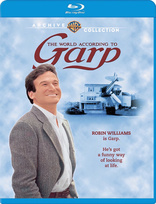The World According to Garp Blu-ray Movie
HomeThe World According to Garp Blu-ray Movie 
Warner Archive CollectionWarner Bros. | 1982 | 136 min | Rated R | Aug 25, 2015
Movie rating
7.3 | / 10 |
Blu-ray rating
| Users | 0.0 | |
| Reviewer | 4.0 | |
| Overall | 4.0 |
Overview
The World According to Garp (1982)
The life of novelist T.S. Garp, and his mother, Jenny, a nurse. While Garp sees himself as a "serious" writer, Jenny writes a feminist manifesto at an opportune time, and becomes a magnet for all manner of distressed women. Based on the novel by John Irving.
Starring: Robin Williams, Mary Beth Hurt, Glenn Close, John Lithgow, Hume CronynDirector: George Roy Hill
| Drama | Uncertain |
| Comedy | Uncertain |
| Romance | Uncertain |
Specifications
Video
Video codec: MPEG-4 AVC
Video resolution: 1080p
Aspect ratio: 1.77:1
Original aspect ratio: 1.85:1
Audio
English: DTS-HD Master Audio 2.0 Mono (48kHz, 24-bit)
Subtitles
English SDH
Discs
50GB Blu-ray Disc
Single disc (1 BD)
Playback
Region A, B (C untested)
Review
Rating summary
| Movie | 4.0 | |
| Video | 4.5 | |
| Audio | 4.0 | |
| Extras | 0.5 | |
| Overall | 4.0 |
The World According to Garp Blu-ray Movie Review
Return of the Undertoad
Reviewed by Michael Reuben August 23, 2015John Irving's fourth novel, The World According to Garp, was published in 1978 and remained a bestseller for years. Copies were everywhere, but I sometimes wondered how many people made it to the end. Garp was densely literary, with stories within stories, and although Irving's sense of comedy was unique, it was also dark and often horrifying. Death and injury lurked around every corner. The novel's protagonist devoted much of his time and energy to anticipating disaster so that he could avoid it, but he usually failed. The novel's sense of inexorable doom was symbolized by the dangerous undertow in the ocean near the house owned by T.S. Garp's mother, misheard by one of his children as "the Undertoad" and imagined as a monstrous amphibian that emerged from the deep and dragged swimmers to their death. Like many artists, Irving exorcised his personal demons by externalizing them, and he has a talent for creating a fantasy version of the real world into which he draws readers with a kind of whimsical narrative voice, then sucker-punches them with something terrible (but always with an absurd and often hilarious twist). He is particularly skilled at incorporating contemporary issues—in the case of Garp, the Seventies version of the women's movement—in caricatures that leave his own position uncertain. Garp has been called both pro- and anti-feminist. In fact, it is neither, just as it is neither pro- nor anti-marriage, adultery, celibacy or any of the other phenomena explored in Garp. Irving simply creates characters who live different aspects of these phenomena and lets them act out their nature. The most that can be said of the author's perspective is that, like his protagonist, he expects the worst but keeps trying. The 1982 film adaptation of Garp by director George Roy Hill (The Sting) received mostly respectful reviews, although fans of the novel were predictably disappointed at the many elements that had to be omitted to condense the sprawling narrative into a film. Critics who either didn't like or hadn't finished the book greeted the film with a reaction summed up by the late Roger Ebert: "What the hell was that all about?" Today, with the novel's notoriety having faded, the film has a better chance of standing on its own merits. It must be said, though, that Hill, working from a screenplay by Steve Tesich (Breaking Away), did a remarkable job of recreating Irving's unique tone for the screen. He did it with careful, inventive casting, well-chosen locations and an unobtrusive style that sneaks up on the viewer much like Irving's prose.
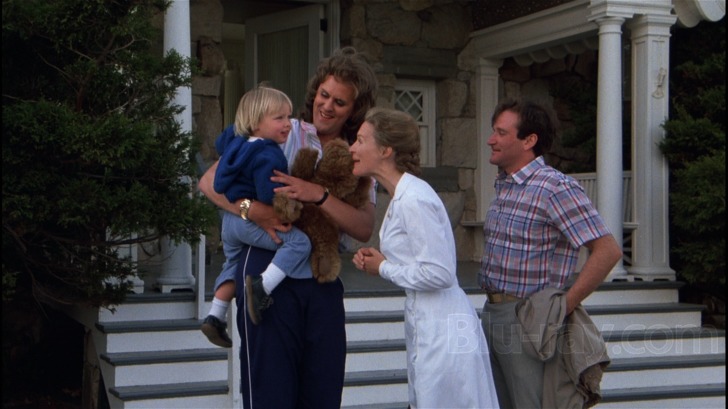
In broad outline, Garp is a biography of the novelist T.S. Garp, whose initials come from the rank ("technical sergeant") of the terminally wounded Army airman whom his mother, a military nurse, used as a sperm donor during World War II. The absence of a father prompts the young Garp (played by James McCall) to spend hours trying to create one in his imagination, which is how he becomes a writer. The fact that his father served in the air corps gives him a life-long fascination with flying, a point that director Hill captures in a clever opening sequence featuring baby Garp floating through the air, as he is tossed and then caught by his unseen mother. The experience becomes one of Garp's treasured memories, especially as an adult when he is constantly aware that, in real life, there is usually no one to catch you when you fall. The teenage/adult Garp is played by Robin Williams in his first major dramatic role, because George Roy Hill was the first director to recognize that Williams' manic comic intensity could be harnessed for serious purposes if he simply held it inside. Garp is an intense, eccentric and often angry individual, and it takes a special kind of performance to convey those qualities without the support of John Irving's authorial voice. In a sequence where Hill shows Garp sitting at the typewriter, inventing and re-inventing a scene he has witnessed on the street (a snatch of an argument between a married couple), the look of inward concentration on Williams' face is essential to creating the impression of an artist being born. Later, after Garp marries Helen Holm (Mary Beth Hurt), the daughter of the wrestling coach at the Steering Academy where his mother took a job as school nurse so that Garp could get a good education for free, Williams' tense body language conveys Garp's often paranoid concern for the safety of their children, Duncan (Nathan Babcock) and Walt (Ian MacGregor). As is so often the case, though, the true threat to the children comes not from outside the home but from the conflicts and lapses of their parents. There are several key women in Garp's life. First and foremost is his mother, Jenny Fields, whose public attire is always her nurse's uniform. Glenn Close made her feature debut playing Jenny and received an Oscar nomination for her memorable rendering of the character's otherworldly quality. The daughter of traditional New England parents (Hume Cronyn and Jessica Tandy, in extended cameos), Jenny Fields seems to have arrived in this life fully formed as a mother and caregiver but without any of the stereotypical baggage of femininity. Above all, she has no interest in sharing her life with a man; she finds the need for their involvement in conception an inconvenience. Sex (or, in Jenny's preferred term, "lust") holds no interest for her. When her son, Garp, reaches the age when his hormones aim him at the opposite sex like a guided missile, Jenny is disapproving but resigned. A more serious point of contention arises between mother and son when Jenny, too, decides to be a writer. She publishes just one book—her autobiography, entitled Sexual Suspect—but it becomes an international bestseller, translated into every imaginable language (including, as Garp discovers with disbelief, Apache). The book makes Jenny more famous than Garp, who quickly becomes known as "the bastard son of Jenny Fields". It also turns Jenny into a feminist icon and a target for hate mail, death threats and assassination attempts from male extremist groups. Jenny uses the extensive royalties to transform her New England seaside home into a haven for women seeking sanctuary. These include a bizarre society known as "the Ellen Jamesians", after a little girl named Ellen James whose rapists cut out her tongue to prevent her from describing them. Members of the society voluntarily have their tongues removed in protest, even after they receive a written request from the real Ellen James begging them to stop. (Garp is so appalled that he writes his own book on the subject. It gets him more publicity than any of his elegantly wrought literary works, most of it unfavorable.) A second key woman in Garp's life is Roberta Muldoon, one of the residents of Jenny's seaside home. A transsexual formerly known as Robert Muldoon, tight end for the Philadelphia Eagles, Roberta is a gentle but towering figure who becomes Jenny's unofficial bodyguard and Garp's best friend. Here again, Hill's casting was inspired. John Lithgow had played several memorable supporting parts for Brian De Palma (including the cold-blooded government killer in Blow Out) and the Broadway director on standby to replace Roy Scheider in All That Jazz, but it took Hill's eye to spot Lithgow's ability to portray one of John Irving's most challenging characters. Roberta Muldoon's emotions are as big and expressive as her stature, and Lithgow's performance is both fearlessly direct and free of camp. (He was the film's other Oscar nomination.) In key scenes where Williams' Garp is holding everything in, Lithgow's Roberta is expressing enough feeling for both of them. The third woman in Garp's life is his wife, Helen, whom he meets while still a student at Steering Academy. Though Helen is far from ordinary, as her interest in Garp confirms, she is the most "normal" of the women in Garp. Their marriage may be unconventional (Garp is a "house husband" before that term was fashionable), but it seems to run smoothly until Jenny Fields's favorite culprit, lust, enters the picture. Adultery is a recurrent theme in John Irving's work, and here it triggers a chain reaction of tragic consequences. Indeed, one of the running motifs in The World According to Garp is the futility of its protagonist's efforts to protect himself and his family from disaster. No matter how hard Garp tries to avoid the Undertoad, the monster always appears, usually when it is least expected.
The World According to Garp Blu-ray Movie, Video Quality 
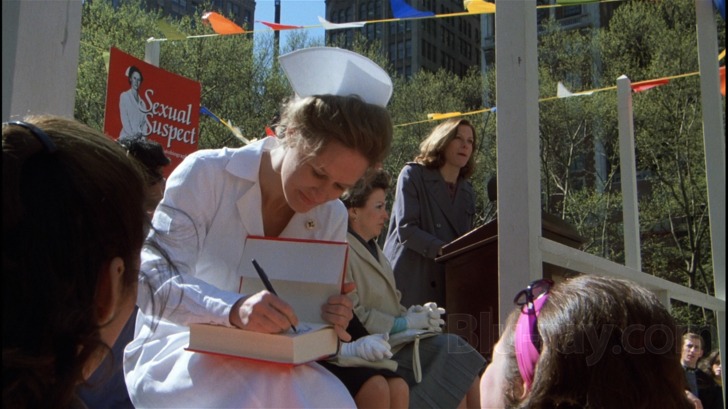
The World According to Garp was shot by Czechoslovakian cinematographer Miroslav Ondrícek, who had previously worked with director George Roy Hill on Slaughterhouse Five and was the regular DP for director Milos Forman. The Warner Archive Collection has newly transferred the film at 2k from a recently created interpositive for this 1080p, AVC-encoded Blu-ray. The results are impressive. Much of Garp is set in the pastoral environs of the Steering Academy, the peaceful New England seaside or the (mostly) quiet suburban location where Garp and Helen raise their family. Hill and Ondricek use a gentle watercolor palette for all three locales that provides a soothing counterpoint to the story's darker elements. (It's one of the film's substitutions for John Irving's quiet narration.) WAC's Blu-ray reproduces these shadings with care and delicacy. Even the relatively brief sequences in New York use soft hues, as compared to the flash of neon and saturation of color with which the Big Apple is often associated. The image is detailed and film-like, with a natural grain pattern that appears undisturbed by untoward digital manipulation. WAC has mastered Garp at what has become its default average bitrate of 35 Mbps, and the encoding has been done skillfully.
The World According to Garp Blu-ray Movie, Audio Quality 
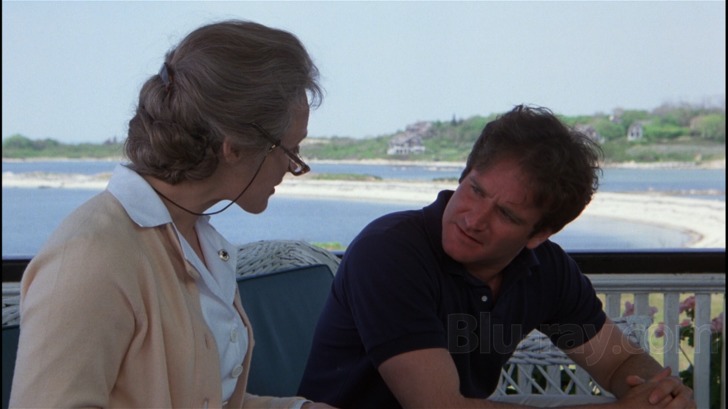
Garp's original mono track is presented in lossless DTS-HD MA 2.0, with identical left and right channels. It's a robust track with good fidelity and dynamic range, clear dialogue and well-mixed sound effects for such diverse events as a small airplane crashing into a house and a high school wrestling tournament. The gentle strains of the Beatles' "When I'm Sixty-Four" open and close the film, having acquired ironic overtones during the two hours or so in between. No composer of original music is listed, but David Shire (Zodiac) is credited as "music adaptor".
The World According to Garp Blu-ray Movie, Special Features and Extras 
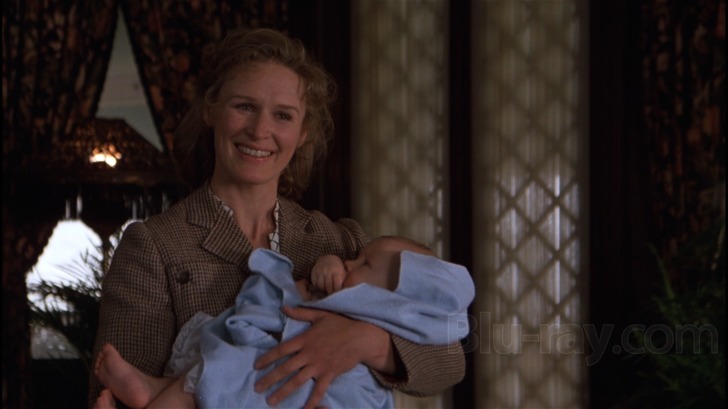
The only extra is a trailer (480i; 1.78:1, enhanced; 2:12), in which you can see the marketing experts working hard to disguise the film as a conventional comedy. Warner's 2001 DVD was similarly featureless.
The World According to Garp Blu-ray Movie, Overall Score and Recommendation 

Timing is everything, says Garp's publisher in explaining the extraordinary sales of Jenny Fields's autobiography. The same applies to The World According to Garp, both the novel and the film. I doubt whether either version of Irving's story could gain much traction in today's world of polarized debate and instant feedback. Long before anyone had spent sufficient time in Irving's alternate universe to absorb its funhouse mirror version of sexual politics and meditate on what it reveals about our world, the issues would have been sliced and diced into sound bites and people would know where they stand without ever reading the book or watching George Roy Hill's adaptation. (You can already hear it: The Ellen Jamesians are a misogynist attack on feminism. Roberta Muldoon is an endorsement of the transsexual "lifestyle". Etc.) Just as Hill's style of moviemaking belongs to an earlier era, so does Garp's dark but contemplative view of the uses of fiction. WAC's Blu-ray is an excellent presentation of this stubbornly individualistic film. Highly recommended for those willing to devote the time and effort.
Similar titles
Similar titles you might also like

Much Ado About Nothing
2012

Terms of Endearment 4K
Paramount Presents #42
1983

Silver Linings Playbook
2012

The Rose Tattoo
1955

Something Borrowed
Movie Only Edition
2011

The Prince of Tides
1991

Monster's Ball
2001

Fever Pitch
Limited Edition to 3000
1997

The Skeleton Twins
2013

The Best Man
1999

Little Children
2006

Midnight Sun
2018

The Art of Racing in the Rain
2019

The Miseducation of Cameron Post
Special Edition
2018

It Runs in the Family
2003

The Best Man Holiday
2013

Imagine Me & You
2005

Titanic
Fox Studio Classics
1953

Waitress
2007

How to Make an American Quilt
1995
